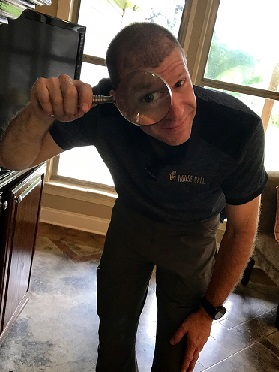Being a home inspector is a fairly unique job. We’re not like typical businesspeople. We don’t have a retail store where our clients meet us. We don’t have things on the shelf that we’ve got to store and manage. We don’t have vendors where we buy our inventory. Most of us don’t really have a lot of products for our clients to choose from, so we can’t get an idea what’s selling better this month versus last. The things that conventional businesses track really don’t apply to us. Without the long list of things that traditional retailers own and control, it can make it harder for us to get a read on where our business stands. If we stop and think about it, we’re really an island unto ourselves.

So, is there really anything that we can say we traffic in? Is there really something we can claim as our own? What metrics can we use to measure our success? What can we peddle to our customers that stands the best chance of helping us to advance our business?
All too often, for rookies as well as industry veterans, when it comes down it, the something that we do end up using is price.
We’re missing a lot of the physical aspects of a business that retailers typically use to track and market to customers. And once these things are removed from the equation, most of us fall back to the easiest part of the equation: the price we charge to our customers.
Too many of us, in our rush to compete on price and focus on getting paid, end up offering the exact same thing that our competitors offer. There’s little effort to differentiate our businesses from the others. We become clones of each other. Looking the same. Acting the same. Sounding the same. Hell, we even dress alike! It’s like we’re pressed from a home inspector mold. Perfect replicas. Plug and play. The customer gets what they get what they get.
And here’s where the problem comes in. When we focus on selling the same thing as everyone else, the only thing we can use to set us apart is our price.
Imagine that we’re going online to buy a new outlet tester. There’s really not much difference between the basic outlet testers. They’re all about the same*. Same features. Same button. Same lights. Same size. (They do have different colors, so there’s that…)
Just like buyers need home inspections, inspectors need outlet testers. We’ve got to get one, so what do most of us end up doing? We either stick with the same brand we’ve been using (because, obviously, if it’s the one that I’m using, it must be the best), or we pick the one that’s the cheapest. If there’s really no difference between a group of products, why would anyone spend more money to get the same thing?
Is there really anything that we can do, any way we can build something into our offering that can differentiate us from the home inspection masses? What can we do to make our product stand apart from all the others?
It just so happens that there is something we can do. And it’s not some cool, new gadget for our tool bags or some fancy new service that we can add onto our normal inspection. It happens to be the same thing that sellers have been doing for as long as anyone can remember. And it’s something that you don’t have to spend an enormous amount of money to get.
What is this miracle item, you ask?
The permission to work with our clients. The permission to communicate our ideas. The permission to do what we do, and the trust of our clients needed to allow us to do it.

But too many of us are so busy trying to do the same thing as everyone else, and do it even cheaper than them, that we forget to do anything else.
This article is based on a blog post by Seth Godin. If you want to be better at what you do, read Seth’s stuff. You can thank me later.
FYI: There are some high-end testing devices. They offer much more than your average outlet tester, but there are some drawbacks: it takes two hands to operate and cost ten times as much as a normal outlet tester. (And currently it doesn’t check for AFCI protection).
I welcome all feedback (both positive and negative) on this post.
Please take a moment to leave a comment below. Thank you!
Want to be an Influencer in Your Field? Share This Post!
Thanks, Joe


